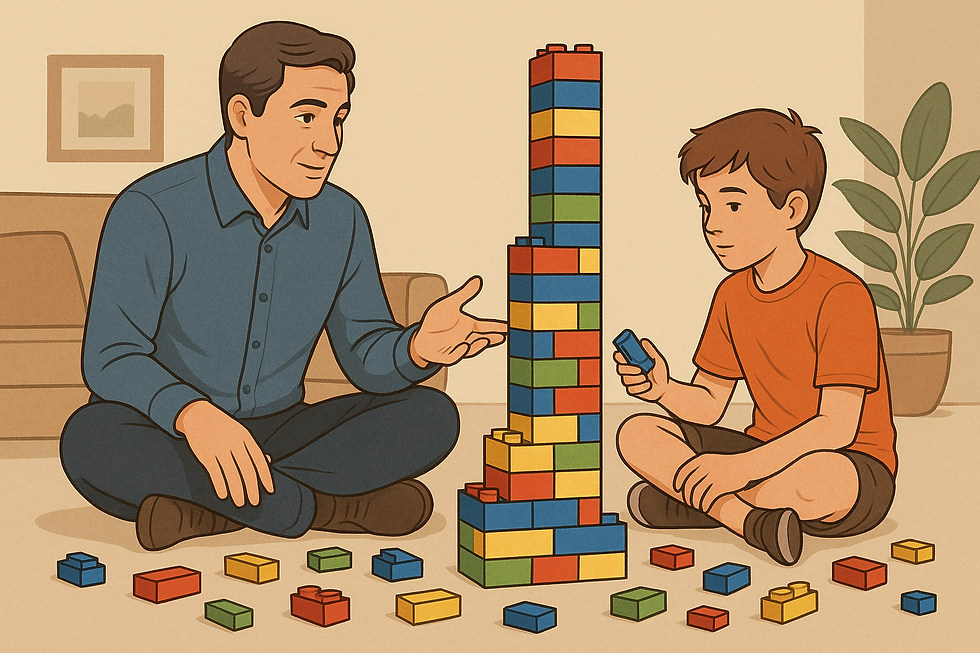Dad Talk: Stability – Building a Life That Lasts
- Sep 25, 2025
- 5 min read

Introduction
When you’re young, stability doesn’t sound exciting. Adventure, fun, freedom... those are the things that get your attention. Stability sounds boring, like something for old people. But here’s the truth: stability is what gives you the ability to enjoy all the good things in life without losing them as quickly as they came. It’s the anchor in the storm, the strong foundation under your house, the roots that keep the tree standing when the wind blows.
That’s why I talk to my boys about building stability. Not just financial stability, but also emotional, moral, and spiritual stability. Without it, life gets tossed around. With it, you can stand strong, and even invite others to stand with you.
Financial Stability – Laying the Bricks Early
Money isn’t everything, but it touches almost everything. Without financial stability, even small problems become big ones. A flat tire, a broken fridge, or a surprise medical bill can knock you off balance if you’re living paycheck to paycheck.
I tell my boys that stability comes from discipline. That means saving a portion of what you earn, avoiding unnecessary debt, and resisting lifestyle creep. Lifestyle creep is what happens when your income rises but your spending rises with it. Instead of getting ahead, you just move the finish line. You feel richer, but your foundation never gets stronger.
For example, imagine you land your first good job after college. You’re making more money than ever before. The temptation is to celebrate: buy the new car, upgrade to a bigger apartment, eat out every night, maybe even take on a credit card or two. For a while, it feels amazing — until life happens. A layoff, a sudden health expense, or even just the rising cost of living, and suddenly that “good job lifestyle” feels like a trap.
Now imagine a different scenario. You still enjoy life, but you choose wisely. You keep the older car for a while longer, learn to cook at home most nights, and make saving automatic, even if it’s just 10 or 15 percent of each paycheck. You start putting money aside in an emergency fund and maybe invest a little in a retirement account or index fund. Over time, that discipline builds a cushion. And when hard times come, and they will, that cushion is what keeps you steady. That cushion is stability.
What Success Looks Like
Picture a man who has lived humbly and steadily. He owns a modest family home, drives reliable vehicles, and avoids wasting money trying to impress others. Over the years, he builds a small business or secures a stable career, and along the way he invests in real estate. Slowly, his rental income begins to grow — until one day, it actually surpasses what he earns from his job.
At that point, he realizes something powerful: even if he got fired tomorrow, his lifestyle wouldn’t collapse. His bills are covered, his savings are strong, and his investments are working for him. He can keep working if he enjoys it, or stop whenever he’s ready. That’s what financial stability looks like. It’s not about being flashy; it’s about being free.
Emotional Stability – Weathering the Storms
Life is going to throw curveballs at you. You might fail a class, lose a job, go through a breakup, or watch a dream fall apart. Emotional stability is what keeps you from collapsing when that happens.
Emotional stability doesn’t mean you never feel sad, angry, or frustrated. It means you can control how you respond. You don’t let emotions drive every decision. You don’t blow up in anger, or quit when things get tough. Instead, you pause, breathe, and think.
I remember being in the military, under pressure, with younger soldiers looking to me for direction. If I panicked, they would panic. If I stayed calm, they followed my lead. That’s emotional stability in action; being the steady one when others are shaken. Young men need to practice this in small ways: finishing homework even when they’re tired, handling disagreements with friends without exploding, or admitting mistakes without shame. Those small habits build big stability later.
Moral & Spiritual Stability – Anchors for Decision-Making
Every person, no matter their background, needs a moral compass. Without it, life becomes a guessing game of right and wrong. With it, you have an anchor when choices aren’t clear.
I tell my boys that faith and values are like a map. You might not know every road, but the compass keeps you from getting completely lost. Most faith traditions share a simple truth: there is a God, and He wants us to treat others with kindness, honesty, and respect. If you can hold on to that, you’ll make far fewer decisions you regret.
Think about the temptations that come your way as a teenager — drugs, alcohol, peer pressure to break the law, or sexual choices that carry lifelong consequences. Without a moral anchor, it’s easy to drift into whatever feels good in the moment. With an anchor, you can stop and ask: Is this the kind of choice that builds the life I want?
Relationship Stability – Choosing Wisely and Building Strongly
Relationships are one of the most important parts of life, and also one of the easiest places to make painful mistakes. Young people often rush in, driven by excitement, only to realize later they weren’t ready.
I tell my sons: be patient. Learn what healthy love looks like. Watch how couples treat each other. Notice which relationships last and which fall apart. Stability in relationships comes from respect, communication, humility, and shared values.
Here’s the truth: if your finances are a mess, your emotions are unstable, and you don’t know what you believe, you’re not ready to build a marriage or raise a family. But if you’ve worked on those things first, your relationship has a much higher chance of lasting. A stable man attracts a stable partner, and together they can build a stable home.

Moral of the Story
Stability doesn’t happen overnight. It’s built slowly, decision by decision, just like stacking Lego blocks. At first it feels small: saving money, choosing friends wisely, resisting peer pressure, keeping your word. But over time those small blocks form a tower that can stand tall and strong.
When you reach stability, you won’t just benefit yourself. You’ll be able to support your spouse, raise your children in a secure home, and even help others in need. That’s the true gift of stability: it multiplies outward.
So I tell my boys, and any young men reading this: Be patient. Don’t chase quick thrills at the expense of a steady life. Build slowly, block by block, until you have a foundation strong enough to carry you and those you love.

Comments